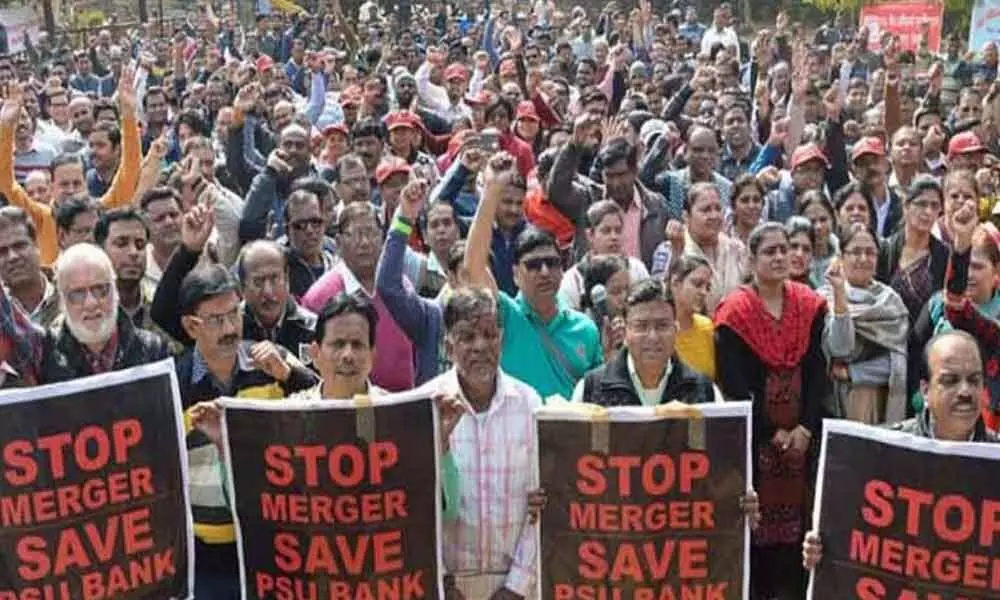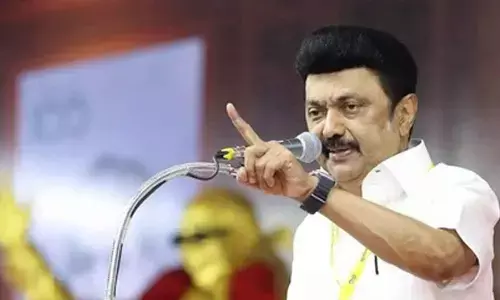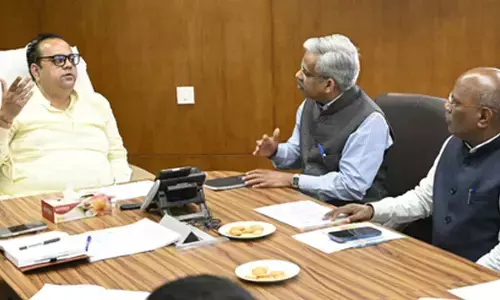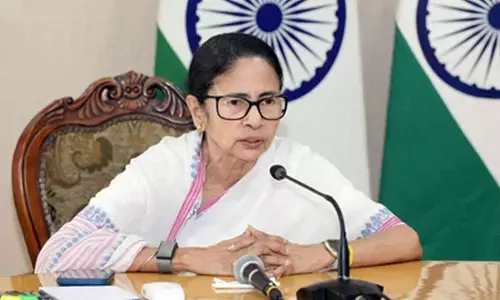Fruitless exercise of bank mergers

The Modi government has thankfully and boldly abstained from interfering in the working of Public Sector Banks (PSBs). Bank officials are able to aggressively pursue the defaulters because there is no pressure from "Delhi" to go easy. Yet, the losses of the PSBs continue to mount. It is clear that good governance on the top is no solution for containing the losses of the PSBs. The problems of the PSBs are more fundamental.
The trigger for nationalisation of private banks in the seventies and establishment of the PSBs was that the private banks were not providing banking facilities in rural areas; and loans to the farmers small and medium industries (SMEs).
This objective has been largely achieved. The number of bank branches in 1952 were 4,061. This only doubled to 8,262 in the next 17 years. In comparison, there was a steep expansion after nationalisation. The number of branches increased more than seven times to 59,752 in the next 20 years ending with 1990. The banking system was made accessible to larger numbers as was intended.
However, the losses of the PSBs increased in tandem. The PSBs suffered losses in running small rural branches where the deposits and loans were less. Thus, the PSBs started closing the rural branches as the pressure mounted on them to cut losses. This led to reversal of the momentum.
The number of branches in the rural areas was 50 percent in 2010. These have declined to 37 percent in 2018. There is a saying in economics that "there is no such thing as a free lunch." The expansion in the rural areas has led to losses to the PSBs. Those losses have had to be borne by the same people for whom the expansion was made.
The farmer got bank services but paid higher taxes to enable the government to infuse capital in the PSBs to make up for those losses. As a result, the PSBs have started to reduce the number of such branches. The purpose of nationalisation of private banks and of establishing PSBs has been undone.
Worse, the monies infused into the PSBs have gone down the drain. The Central government has infused Rs 3 lakh crore into the PSBs in the last five years. Yet, the total market capitalisation of the PSBs today is only about Rs 2.8 lakh crore. This means that all the capital that the nation had invested in the PSBs from 1971 to 2014 has been wiped out. Many indicators are available telling their sad state.
The PSBs have lent 70 percent of all outstanding loans but they account for 90 percent of the bad loans called "Non-Performing Assets." Foreign Direct Investment in PSBs is only 5 percent of their capital against 35 percent in private banks. Foreign investors have no confidence in the PSBs.
The main reason for the tragedy of the PSBs is the personal interests of its employees. The owner of a private bank wants his bank to make profit and grow because his personal benefits are directly aligned with those of his bank. The future of his business interests is affected by the performance of his bank.
Not so for the PSB managers. It can and often is beneficial for them to make personal monies through corruption while the bank sinks. The employees of the PSBs have eaten away all the money that the nation had invested up to 2014. The fact that the PSBs continue to incur losses even after the Modi government has stopped interfering in their working proves that the problem is with the employees, not with the government.
The only solution to this problem is privatisation of the PSBs. The P J Nayak Committee established by the government had recommended in 2014 as such. Unfortunately, the government has been driven by the PSB bureaucracy and this report has been put in the cold storage.
The main argument against privatisation is the lack of interest in private banks in catering to the rural areas and SMEs. Actually, this problem has arisen because of regulatory failure on part of the Reserve Bank of India (RBI). The RBI has adequate powers to force the private banks in this direction.
Thus, Urjit Patel, former Governor of the RBI said at Stanford University soon after demitting office: "The supervisor had failed to acknowledge and rectify government banks' inability to identify poor performing assets; and restructure and react quickly to improve recovery and cut losses.
The regulator failed in gauging when extant assumptions were getting stretched and needed revision." We are back to square one. Private Banks were nationalised because the RBI did not push them to go to the rural areas and lend to the SMEs. Now we find that fifty years after nationalisation, the RBI has again failed to regulate the PSBs. It is time now to privatise the PSBs and strengthen the RBI's function to push them in a socially desirable direction.
The decision of the government to merger weak PSBs with relatively stranger PSBs falls flat against this background. If the so-called stronger banks have themselves wiped out all the capital invested in them by the government in the 43 years from 1971 to 2014, pray, how will they conserve the capital invested in the weaker PSBs? Observers suggest that the only purpose of the mergers is to hide the continuous capital infusion in the PSBs from the public glare.
At present the weaker PSBs are incurring losses and the government is infusing capital into them to keep them afloat. This capital infusion shows up in the finances of the government. It has to be shown in the budget. Now this infusion will take place within the balance sheets of the relatively stronger banks and the government will not have to show this in the budget.
It is like the head of the family directing the stronger son to carry the disabled son on his shoulders so that the he does not have to do so himself. The strike by the bank employees against merger is even more unfortunate. As said above, the main problem of the PSBs is the inefficiency and corruption.
The employees have gone on strike to protect these unholy interests of theirs. If we have to face their strike anyways, the government should privatise the PSBs and face them on privatisation so that, at the end of the day, we at least have a solution to the sucking of the national wealth by the PSBs.
(The writer is formerly Professor of Economics at IIM, Bengaluru)








